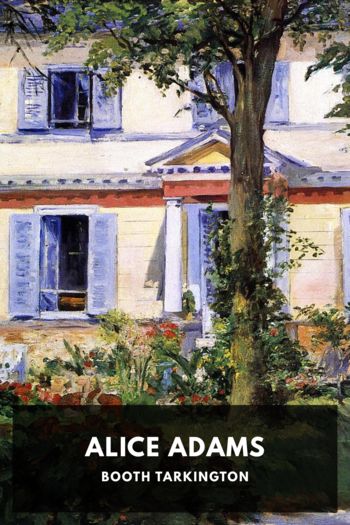National Avenue - Booth Tarkington (the little red hen ebook TXT) 📗

- Author: Booth Tarkington
Book online «National Avenue - Booth Tarkington (the little red hen ebook TXT) 📗». Author Booth Tarkington
“No, sir; not about the history of it or anything that’s past. But about the future—”
“You listen!” Shelby commanded irascibly. “You come around here blowin’ out your chest and tellin’ us old settlers that this town has grown some—”
“No, sir; I know you know all about that a thousand times better’n I do. I only use it to prove the town’s goin’ to keep on growin’. Why, Mr. Shelby, ten years from now—”
“Great Gee-mun-nently!” the old man shouted. “Can’t you listen at all? Of course it’s goin’ to keep on growin’, but not the way you think it is. It’s already reached its land size, or mighty near it, because there’s plenty vacant lots inside the city limits—hunderds and hunderds of ’em—and people want to live near their business; they don’t want to go way out in the country where there ain’t any sewers nor any gas nor city water.”
“But they’ll get all that, Mr. Shelby. They will as soon as there’s enough of ’em to make it pay the water company and the gas company to run their pipes out; and there’d be enough of ’em, if you’d lay even a single track out to—”
“Out to Ranse Ornaby’s frog pond!” the old man interrupted angrily. “You think if I’d throw away a hundred thousand dollars like so much dirt, that’d bring the millennium to the old hog-wallow, do you, young man? Look out that window behind you. What’s the biggest thing you see?”
“The First National Bank Building.”
“Yes, sir. Eleven stories high, and the Sheridan Trust Company’s got plans to put up a block higher’n that. People’ll build up in the air, not only for business, but to live in flats, but they won’t go ’way out to a hog-wallow in the country when there ain’t a reason on earth for ’em to. You seem to think people ride on streetcars for pleasure! Well, I’ve had some experience in the business, and I can tell you they don’t, except in mighty hot weather; they ride on streetcars to get somewhere they want to go; and goodness knows nobody wants to go to Ranse Ornaby’s farm.”
“But, Mr. Shelby, if you’d listen just a minute—”
“I’ve listened all I’m a-goin’ to,” the old man said decisively. “This is the fourth time you been here tellin’ me all about this town that wouldn’t be here if it wasn’t for me and some the other men you been lecturin’ to about it. You go at me as if I’d just put up at the hotel and never saw the place before, and what’s worse you’ve gone and got Martha so she keeps ding-dongin’ at me till I can’t eat my supper in peace! It’s about time for you to understand it’s no use.”
“But, Mr. Shelby, if you’d just let me put the facts before you—”
“Facts about what’s goin’ to happen ten years from now? No, sir!” The swivel-chair began to turn, making it clear that this interview had drawn to a close. “I thank you, but I can make up my own facts, if I so desire!” And the back of the chair and its occupant were offered to the view of the caller.
Dan made a final effort. “Mr. Shelby, I hope you don’t mean this for your last word on the subject, because just as sure as you’re born the day will come when—”
“Will it?” the old man interrupted; and turned his head angrily, so that his neat beard was thrust upward by his shoulder and seemed to bristle. “You go teach your grandma Savage to suck eggs,” he said with fierce mockery, “but don’t come around here any more tellin’ me where I better lay my car tracks!”
“Well, sir, I—”
“That’s all!”
“Yes, sir,” Dan said, a little depressed for the moment.
But in the hall, outside the office, he recovered his cheerfulness, and, after consulting a memorandum book, decided to call on Mr. George Howe, the president of the First National Bank. Since yesterday Dan had thought of several new things that were certain to happen within the next ten years.
VIINo figure was more familiar to the downtown streets of those days than that of the young promoter of Ornaby Addition. Always in a hurry and usually with eyes fixed on what appeared to be something important in the distance, he had the air of a man hastening to complete a profitable transaction before train-time. Now and then, as he strode along, his coat blowing out behind him in the spring breeze, his gaze would be not upon the distance, but eagerly engaged in computations, with the aid of a shabby memorandum book and an obviously dangerous fountain pen. Moreover, the shabbiness of the memorandum book was not out of keeping with the rest of him; for here again Harlan’s sketch of his brother failed to exaggerate. Dan’s metropolitan gloss had disappeared almost in a day, and though it might make a brief reappearance upon Sundays, when he walked to church with his mother and swung the gold-topped cane as he talked earnestly to her of Ornaby Addition, yet for the rest of the week he did seem to be almost unconscious, as Harlan said, of what he wore; so much so that his mother gently scolded him about it.
“What will people think of me,” she asked, “if you insist on going about with two buttons off your vest, and looking as if you haven’t had anything pressed since the flood? Whenever I do get one of your suits to look respectable, you wear it out to the farm and





Comments (0)